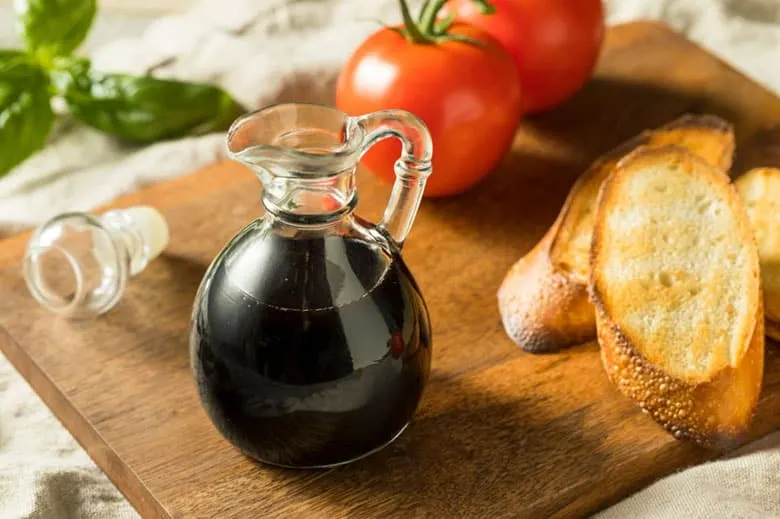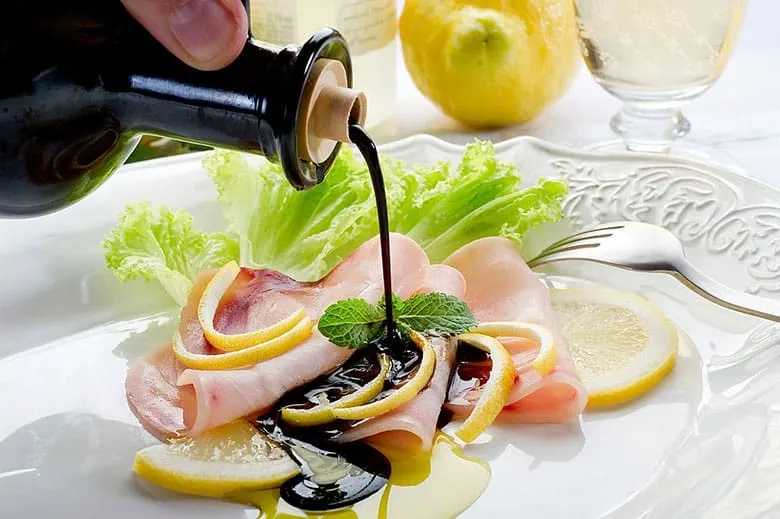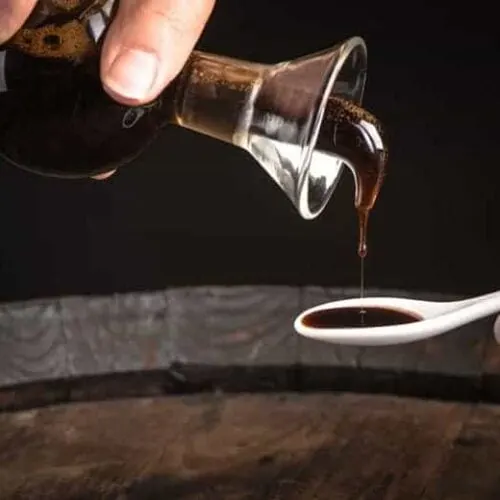Balsamic vinegar is a type of vinegar that has been around for centuries.
It’s most commonly used in salad dressings, but it can also be used as an ingredient or condiment in many dishes.
One thing for sure: you are going to love the way your food tastes when you use balsamic vinegar as an ingredient!
This blog post will discuss what balsamic vinegar tastes like, how it can be used in cooking, and the difference between them and regular white vinegar.
What is Balsamic Vinegar?

Balsamic vinegar is a type of vinegar made from wine that has been cooked and reduced to syrup.
It is aged for at least 12 years in wooden barrels, which gives it its distinctive dark color and rich flavor.
Balsamic vinegar often described as “liquid gold” is one of the oldest types and most prized.
It takes years to age but when done properly it can be delicious with a sweet taste that resembles honey or molasses and an earthy aroma reminiscent of fruit-filled wine barrels.
Aging balsamic starts from grape juice which ferments for 10 days before being boiled down into what we call “must”.
The syrup can be aged in various types of wooden barrels, including oak, chestnut, cherrywood, juniper wood, mulberry wood, and acacia wood.
Depending on the type of barrel used for aging balsamic vinegar can take anywhere from 3-12 years to complete its fermentation process.
What Does Balsamic Vinegar Do To Meat?

Balsamic vinegar is one of the most versatile ingredients you can use in your cooking, but it’s also one of the most misunderstood.
The truth is that balsamic vinegar tenderizes the meat by breaking down proteins and dissolving muscle fibers, making them more tender and flavorful than they would be without any balsamic at all.
And while some vinegar is acidic enough to toughen up your dinner, the balsamic has just the right amount of acidity to enhance flavor while keeping your food juicy and tender.
When balsamic vinegar is mixed with olive oil, it creates a rich and tangy marinade sauce for meat dishes.
Basting your meat with this combination throughout the cooking process will help seal in juices and add a rich flavor.
And for those of you who are vegetarian or vegan, balsamic vinegar can work wonders on your vegetables too.
A drizzle mixed with olive oil is perfect as an alternative to butter when baking potatoes.
What Does Balsamic Vinegar Taste Like?

Like most vinegar, balsamic vinegar has a tart and tangy flavor that is a little sweet, but the sweetness of balsamic vinegar comes from aging.
The flavor of balsamic vinegar ranges from sweet and mild to tangy and sharp depending on the age of the product.
It’s most often used as an ingredient to add flavor or zest to many dishes including salads, meats like pork and beef, fish such as salmon or swordfish (among other things).
The texture of balsamic vinegar is usually smooth and thick, which makes it easy to use in sauces.
It is also a popular ingredient for salad dressings because of its flavor balance between acidic tartness with mellow sweetness from the aging process; this mix gives balsamic vinegar an intense depth that’s unlike any other vinegar.
Why Balsamic Vinegar Is Bad For You?

The aging process lends balsamic vinegar its unique flavor, but it also makes the product far less healthy than you might think.
It contains high levels of sugar and calories, which can lead to obesity and diabetes if consumed in large quantities.
Consuming foods containing excess amounts of sugar will make you more prone to bacterial growth.
The acetic acid found naturally present in this vinegar is not as detrimental to health as previously thought but there has been some evidence that higher levels may lead to stomach ulcers and heartburn due to its acidic nature.
Also, vinegar has been shown to slow down digestion, which means you will feel hungry sooner than if you ate something else.
Even though, balsamic vinegar is a tasty and sometimes necessary ingredient in many recipes. It’s important to consume balsamic vinegar in moderation.
What Is The Best Balsamic Vinegar To Buy?

There are many different types of balsamic vinegar on the market, but it can be difficult to determine what is best for you. Balsamic vinegar comes in a variety of grades and colors, and some have been aged longer than others.
Just because one bottle is more expensive doesn’t mean that it’s better quality. “Best” will largely depend upon your preference; Some people prefer sweeter vinegar while others want tangier ones (acid).
In general, a good quality balsamic vinegar will have a deep flavor and a dark color. You want to avoid any kinds of vinegar with artificial ingredients or additives as they may affect the taste of your food and drinks.
Some of the most popular brands include Aceto Balsamico Tradizionale di Modena, Colavita, Lucini Italia, and Pompeian. It’s important to find a brand that you like and can afford.
Does Balsamic Vinegar Need Refrigeration?

Vinegar is a healthy condiment, but it tastes best when it’s fresh. Balsamic vinegar has a shelf life of 2 years when stored at room temperature (70°F). Refrigeration can double this time and freezing it will triple it.
Vinegar does not need refrigerated if you use it within six months from its production date or when opened.
If you keep vinegar for more than six months, then you should store it in a cool place like your pantry until the next use.
You can also store vinegar at room temperature after opening as long as you don’t see any mold growing on top of the liquid portion or inside the bottle itself.
What Is The Difference Between Balsamic Vinegar and Regular Vinegar?

Balsamic vinegar is made from a base of grape juice that has been fermented and then aged in wooden barrels for at least 12 years.
Regular vinegar, on the other hand, is produced by fermenting grain alcohol with an added bacteria strain.
The production methods for balsamic vinegar and regular white vinegar are very different. Balsamic vinegar is made from grapes whereas regular white vinegar is made from grains like corn or wheat.
Additionally, regular vinegar uses chemical additives to boost its flavor while balsamic does not contain any chemicals at all.
The most notable difference between the two types of vinegar lies in sweetness: balsamic has a much sweeter taste than other, more sour varieties.
Conclusion
In conclusion, balsamic vinegar is a wonderful type of vinegar, it’s sweeter than other vinegar which can make for an interesting addition to salads and dishes.
The only downside is that balsamic isn’t as versatile since its sweet flavor may not go well with certain foods.
But, if you want to add some rich, sweet taste to your dish, balsamic vinegar is a perfect choice.

What Does Balsamic Vinegar Taste Like? Does Balsamic Vinegar Taste Good?
Ingredients
- Balsamic vinegar
- Ingredients from your favorite recipes
Instructions
- Depending on the recipes you choose, the taste can vastly differ.
- For authentic results, it is important to choose a recipe that will highlight the original flavor.
- Have fun experimenting with different recipes and taste tests!
